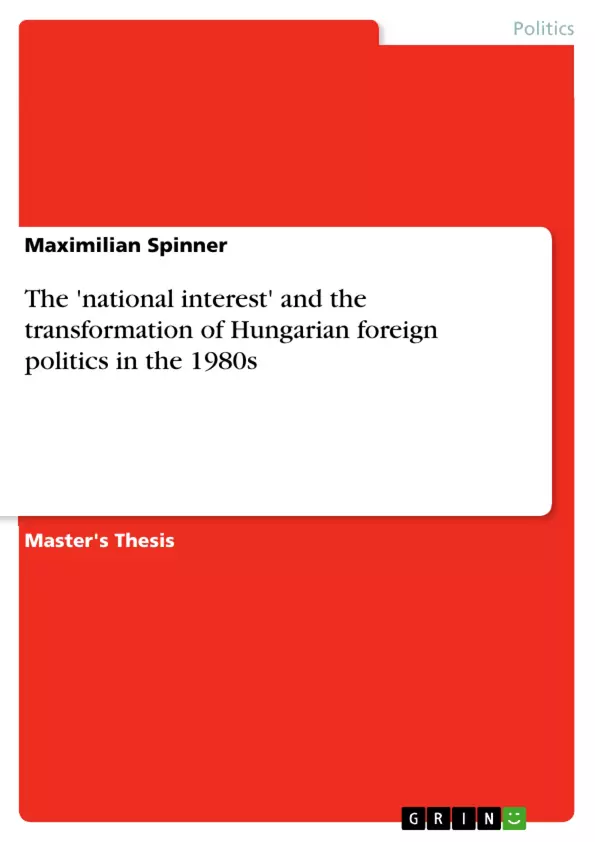The reformulation of the national interest in Hungarian foreign politics in the mid- and late 1980s paved the way for a domestic reform process which lead to the peaceful transition to democracy. Hungary's democratisation cannot be understood without a reference to the preceding reformulation of its foreign policy, e.g. with regard to its neighbour Romania with a large Hungarian minority. In the economic domain this process meant an opening up for Western influence and an increasing losening of Hungary's integration with COMECON and the Soviet bloc. Contemporary sources from Hungary, the Soviet Union and the West are extensively used to substantiate the findings.
Inhaltsverzeichnis (Table of Contents)
- Introduction
- Preconditions: The Hungarian model and the Soviet bloc after 1956
- The crisis of the 1980s: Growing internal and external constraints
- Leaving the Socialist camp on tiptoe: Hungary, socialist internationalism, nationalism and Europe
- The dialectics of the national and the international: 'National Interest' versus 'Socialist Internationalism'
- Gorbachev's ‘new thinking', the Brezhnev doctrine and the Hungarian Model
- Identity Politics: National revival, European traditions and the end of communism
Zielsetzung und Themenschwerpunkte (Objectives and Key Themes)
This dissertation examines the transformation of Hungarian foreign policy in the 1980s and its impact on the country's transition from communism to a market and democracy. It analyzes the development of key issues in the foreign policy debate, international reactions, and the later extension of these issues to a domestic debate with repercussions on reform policies.
- The role of the "national interest" in shaping Hungarian foreign policy
- The impact of Gorbachev's reforms and the demise of the Brezhnev doctrine on Hungary
- The relationship between domestic reforms and foreign policy
- The influence of Hungary's national legacies on its transition to a pro-European state
- Comparisons between Hungary's transformation and those of other East European countries
Zusammenfassung der Kapitel (Chapter Summaries)
- Introduction: This chapter introduces the topic and argues that the foreign policy debate of the 1980s is often neglected in discussions of Hungary's transformation. It highlights the importance of analyzing the perceptions and strategies of the late Hungarian communist leadership in the context of the country's transition.
- Preconditions: The Hungarian model and the Soviet bloc after 1956: This chapter explores the complex interdependence of domestic politics, economics, and external relations in Hungary after 1956. It analyzes the legacies of 1956 and the Kádár era and their influence on Hungary's foreign policy.
- The crisis of the 1980s: Growing internal and external constraints: This chapter discusses the economic and political challenges that Hungary faced in the 1980s. It examines the effects of failed domestic reforms, mounting debts to western lenders, and deteriorating terms of trade with the USSR in the context of the renewed Cold War.
- Leaving the Socialist camp on tiptoe: Hungary, socialist internationalism, nationalism and Europe: This chapter explores the evolution of Hungarian foreign policy in the 1980s, particularly the increasing independence from the Soviet bloc. It examines the development of the "national interest" as a justification for these independent policies.
Schlüsselwörter (Keywords)
This dissertation focuses on the key concepts of "national interest," "socialist internationalism," and "European integration" as they relate to the transformation of Hungarian foreign policy in the 1980s. It also explores themes like the impact of Gorbachev's reforms, the demise of the Brezhnev doctrine, and the relationship between domestic reforms and foreign policy. These concepts are further explored through comparisons with other East European countries, particularly those that pursued "national communism" during the transition period.
Frequently Asked Questions
How did Hungarian foreign policy change in the 1980s?
It shifted toward a reformulation of "national interest," leading to an opening to the West and a loosening of ties with the Soviet bloc and COMECON.
What role did the "national interest" play in the transition to democracy?
The reformulation of national interest provided a justification for independent policies and paved the way for domestic reforms and a peaceful transition.
How did Gorbachev's "new thinking" affect Hungary?
Gorbachev's reforms and the demise of the Brezhnev doctrine allowed Hungary more autonomy to pursue its own "Hungarian model" of reform.
What were the economic constraints Hungary faced in the 1980s?
Hungary faced mounting debts to Western lenders, failed domestic reforms, and deteriorating trade terms with the USSR.
Why was the relationship with Romania important to Hungarian foreign policy?
The presence of a large Hungarian minority in Romania was a key factor in the reformulation of Hungary's foreign policy and national identity.
- Arbeit zitieren
- Maximilian Spinner (Autor:in), 2002, The 'national interest' and the transformation of Hungarian foreign politics in the 1980s, München, GRIN Verlag, https://www.grin.com/document/13306



